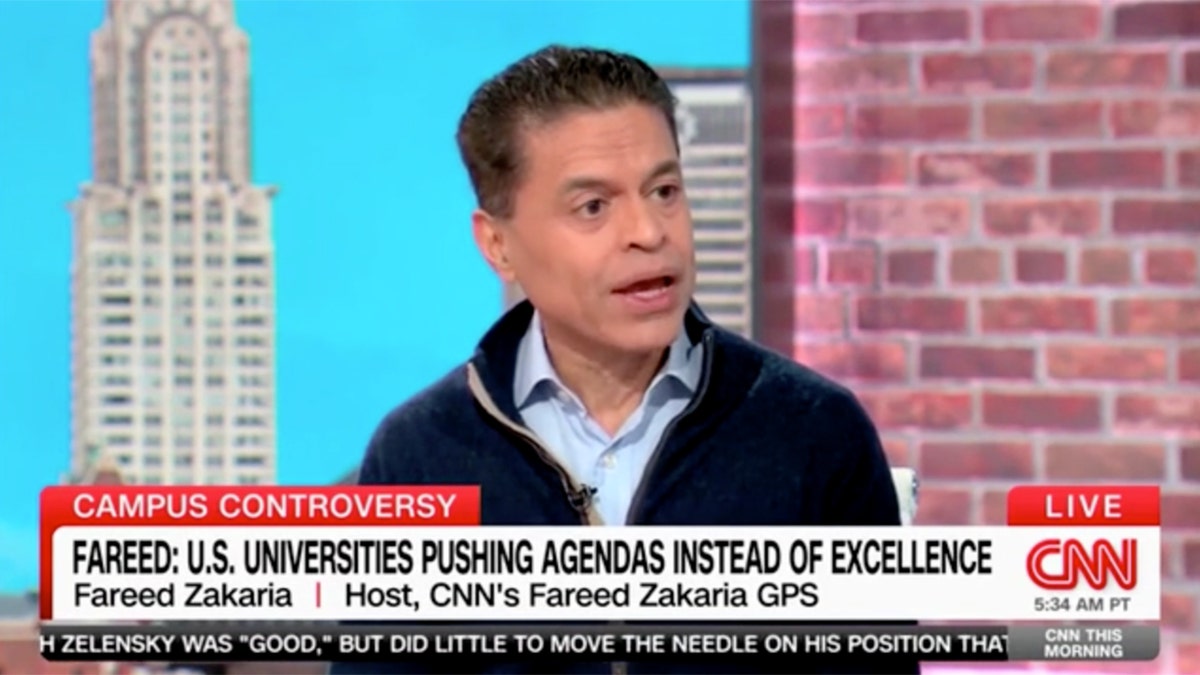CNN host doubles down on criticsm of elite universities pushing politics: 'Walking through a minefield'
CNN's Fareed Zakaria doubled down on his criticism of elite universities on Wednesday and said college students feel like they're walking through a "minefield" and are so afraid of offending people.
CNN host Fareed Zakaria doubled down on his criticism of elite universities, such as Yale and Harvard, and argued that college students were walking through a "minefield" because they're afraid to "offend" others.
"So it’s been very sad to watch over the last 10 or 15 years the way in which these universities have, you know, as I say, moved away from a core focus which should really just be about education, research, learning, teaching, and they have gotten into all these political issues. You know, they start telling students how to speak, how to even dress," Zakaria said. "They have created these ideas of safe spaces and all of that detracts from two things. One, what should be the focus? Education. But the other is it creates these categories of protected people, almost a kind of racial hierarchy."
He said that Jewish students and faculty felt like, "for 15 years you have been talking about safe space and microaggressions and telling students how to talk and dress and eat. And none of this applies to us? None of this applies to Jews."
Zakaria argued that the whole point of going to college was to be exposed to new ideas.

CNN host Fareed Zakaria doubled down on his criticism of elite universities on Wednesday during "CNN This Morning." (Screenshot/CNN)
"So people going through colleges, it’s like a minefield," he said. "They don’t know what to say, because they are so scared they might offend somebody. You don’t actually clarify your own thinking, which is, again, the point of college."
CNN host Poppy Harlow also asked Zakaria about some criticism he received for speaking out and said one viewer compared him to Gov. Ron DeSantis, R-Fla., and a "DEI opponent."
"I think this is an issue that unites left and right. You know Bill Maher has been on these kinds of issues. I do think that there are people on the right who have, you know, detected it and then weaponized for their reasons. But that cannot be a reason not to take it seriously…. Sometimes criticism comes from interesting quarters and you judge by the argument, not by the person," he said.
Following a congressional hearing on rising antisemitism on college campuses, University of Pennsylvania's president, Liz Magill, resigned after facing mounting pressure.

The presidents of UPenn, Harvard and MIT testified last week about anti-Semitism on their campuses. (getty images)
Magill was asked if "calling for the genocide of Jews violate[s] Penn’s rules or code of conduct" during the hearing.
"If the speech turns into conduct, it can be harassment, yes," Magill responded, adding, "it is a context-dependent decision."
Following several calls to resign over her antisemitism remarks and allegations of plagiarism, Harvard's board stood by President Claudine Gay, as the "right leader to help our community heal and to address the very serious societal issues we are facing."
CLICK HERE TO GET THE FOX NEWS APP
In Zakaria's initial criticism, which went viral on social media, he also noted Jewish students were questioning why they were not being protected.
"If universities can take positions against free speech to make some groups feel safe, why not us? Having coddled so many student groups for so long, university administrators found themselves squirming, unable to explain why certain groups [like] Jews [and] Asians don’t seem to count in these conversations," he said.










































